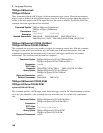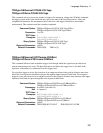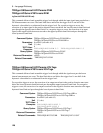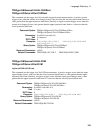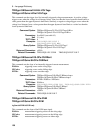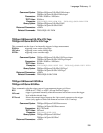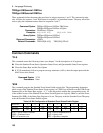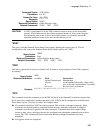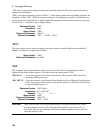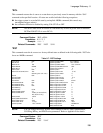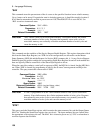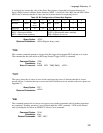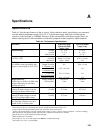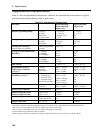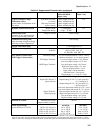
8 – Language Dictionary
134
*OPC does not prevent processing of subsequent commands, but bit 0 will not be set until all pending
operations are completed.
*OPC? causes the instrument to place an ASCII "1" in the Output Queue when all pending operations are
completed. Unlike *OPC, *OPC? prevents processing of all subsequent commands. It is intended to be
used at the end of a command line so that the application program can then monitor the bus for data until
it receives the "1" from the dc source Output Queue.
Command Syntax
*OPC
Parameters
None
Query Syntax
*OPC?
Returned Parameters
<NR1> 1
Related Commands
*OPC *TRIG *WAI
*OPT?
This query requests the dc source to identify any options that are installed. Options are identified by
number. A 0 indicates no options are installed.
Query Syntax
*OPT?
Returned Parameters
<AARD>
*PSC
This command controls the automatic clearing at power-on of the Service Request Enable and the
Standard Event Status Enable registers. The query returns the current state of *PSC.
*PSC ON | 1
causes these registers to be cleared at power-on. This prevents a PON event from
generating SRQ at power-on.
*PSC OFF | 0
causes the contents of the Standard Event Enable and Service Request Enable registers
to be saved in nonvolatile memory and recalled at power-on. This allows a PON event
to generate SRQ at power-on.
Command Syntax
*PSC <Bool>
Parameters
0 | 1 | OFF | ON
Example
*PSC 0 *PSC 1
Query Syntax
*PSC?
Returned Parameters
<NR1>0|1
Related Commands
*ESE *SRE
CAUTION: *PSC causes a write cycle to nonvolatile memory. Nonvolatile memory has a finite
maximum number of write cycles. Programs that repeatedly cause write cycles to
nonvolatile memory can eventually exceed the maximum number of write cycles and
cause the memory to fail.



